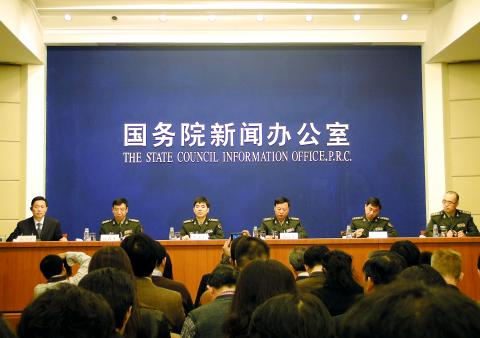China said yesterday it faced an increasingly “volatile” Asian region where the US has expanded its strategic footprint, maintaining that better military ties between Beijing and Washington rested on respect for each other’s interests.
China’s People’s Liberation Army (PLA) spelled out its concerns about US intentions in a policy paper setting out broad priorities for Beijing’s growing military forces.
The “white paper” said that while China wants to avoid military confrontation and focus on growing its economy, it sees potential security challenges across the region, many of them bound up with Washington’s web of alliances and military forces across Asia, including on the tense Korean peninsula.

Photo: CNA
“Profound changes are taking shape in the Asia-Pacific strategic landscape. Relevant major powers are increasing their strategic investment,” said China’s defense white paper for 2010 which, despite its date, was released only yesterday.
“The United States is reinforcing its regional military alliances and increasing its involvement in regional security affairs,” it said. “Suspicion about China, interference and countering moves against China from the outside are on the increase.”
US weapons sales continue to Taiwan, hampering the peaceful development of cross-strait relations, the paper said. It also singled out the Korean peninsula and Afghanistan as sources of worry.
“Asia-Pacific security is becoming more intricate and volatile,” the paper said. “International military competition remains fierce.”
Last year, Beijing and Washington wrangled over North Korea, an ally of China, which ignited regional alarm by allegedly torpedoing a South Korean navy ship, and later shelling a South Korean island.
North Korea denied downing the ship, and China refused to join other countries in condemning Pyongyang. Instead, Beijing chided the US for holding military exercises with South Korea in seas across from China’s coast.
PLA officer, Geng Yansheng (耿雁生), said Beijing nonetheless wants better military ties with Washington, and that a senior Chinese commander, the PLA Chief of General Staff Chen Bingde (陳炳德), would visit the US next month, following on from US Defense Secretary Robert Gates’ visit to Beijing in January.
“Healthy and stable military ties is important for both sides in striving to build a China-US cooperative partnership based on mutual respect and mutual benefit,” Geng, who is a spokesman for China’s Defense Ministry, told a news conference to introduce the white paper.
Geng indicated that China’s concerns about Taiwan and other issues that it calls “core” strategic interests have not eased altogether.
“There remain some difficulties and challenges in China-US military relations,” he said, adding that defusing them required, “in particular, respecting each other’s core interests and major security concerns.”

The CIA has a message for Chinese government officials worried about their place in Chinese President Xi Jinping’s (習近平) government: Come work with us. The agency released two Mandarin-language videos on social media on Thursday inviting disgruntled officials to contact the CIA. The recruitment videos posted on YouTube and X racked up more than 5 million views combined in their first day. The outreach comes as CIA Director John Ratcliffe has vowed to boost the agency’s use of intelligence from human sources and its focus on China, which has recently targeted US officials with its own espionage operations. The videos are “aimed at

STEADFAST FRIEND: The bills encourage increased Taiwan-US engagement and address China’s distortion of UN Resolution 2758 to isolate Taiwan internationally The Presidential Office yesterday thanked the US House of Representatives for unanimously passing two Taiwan-related bills highlighting its solid support for Taiwan’s democracy and global participation, and for deepening bilateral relations. One of the bills, the Taiwan Assurance Implementation Act, requires the US Department of State to periodically review its guidelines for engagement with Taiwan, and report to the US Congress on the guidelines and plans to lift self-imposed limitations on US-Taiwan engagement. The other bill is the Taiwan International Solidarity Act, which clarifies that UN Resolution 2758 does not address the issue of the representation of Taiwan or its people in

DEFENDING DEMOCRACY: Taiwan shares the same values as those that fought in WWII, and nations must unite to halt the expansion of a new authoritarian bloc, Lai said The government yesterday held a commemoration ceremony for Victory in Europe (V-E) Day, joining the rest of the world for the first time to mark the anniversary of the end of World War II in Europe. Taiwan honoring V-E Day signifies “our growing connections with the international community,” President William Lai (賴清德) said at a reception in Taipei on the 80th anniversary of V-E Day. One of the major lessons of World War II is that “authoritarianism and aggression lead only to slaughter, tragedy and greater inequality,” Lai said. Even more importantly, the war also taught people that “those who cherish peace cannot

US Indo-Pacific Commander Admiral Samuel Paparo on Friday expressed concern over the rate at which China is diversifying its military exercises, the Financial Times (FT) reported on Saturday. “The rates of change on the depth and breadth of their exercises is the one non-linear effect that I’ve seen in the last year that wakes me up at night or keeps me up at night,” Paparo was quoted by FT as saying while attending the annual Sedona Forum at the McCain Institute in Arizona. Paparo also expressed concern over the speed with which China was expanding its military. While the US